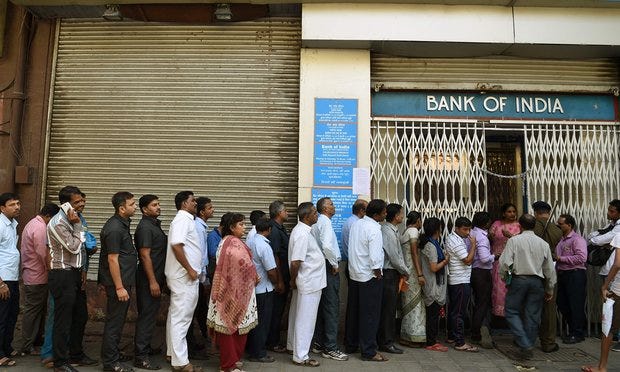Controlling your own wealth as a basic human right
A few months ago, the Indian government withdrew 86% of banknotes in circulation. Ostensibly, it was to cut down on the black market economy and tax cheats, but it also wiped out a large percentage of the wealth of the poorest people, who hold their wealth in cash. A few weeks later, Venezuela followed with a similar measure.
People waiting in line to deposit bank notes before the deadline. The 500 and 1,000 rupee notes were scrapped.
This got me thinking, to what degree do people control their own wealth today, and should they have more control?
Who controls money?
For most of human history, individuals had very little control of their own wealth. Warring tribes raided villages and all-powerful kings and emperors could seize your property on a whim. If you worked hard and managed to accumulate some wealth, it wasn’t entirely clear that you would be able to keep it, so most people were content to keep their head down, eke out a meager existence, and not draw too much attention.
But something important happened in the 17th century as property rightswere established. In the Second Treatise on Civil Government (1689) John Locke wrote:
everyman has a property in his person; this nobody has a right to but himself. The labor of his body and the work of his hand, we may say, are properly his
– John Locke
This began a shift in society, where people could keep more of the proceeds from their work. It also meant that your position (class, caste, etc) was not set at birth. With hard work, you could be self made, and create a better life for yourself and your children.
With upward mobility becoming possible, people began creating new products and services, hoping to strike it rich. Innovation began to accelerate, which improved life for everyone, rich and poor. In some cultures, it eventually became more favorable to be viewed as self made versus being born into wealthâ—âa stark contrast from the age of kings and emperors.
Paul Graham writes that, “a great deal has been written about the causes of the Industrial Revolution. But surely a necessary, if not sufficient, condition was that people who made fortunes be able to enjoy them in peace.”
Not only did letting people control their own wealth accelerate innovation, it also attracted the best and brightest to certain countries. In the United States, for example, 51% of billion dollar tech startups are started by immigrants.
Unfortunately, this idea has not taken hold everywhere in the world. India seizing bank notes is just one small example. Here are some recent examples from around the world:
- In 2008 Argentina nationalized $30B in private pensions.
- In 2013, Cyprus seized up to 40% of citizens money out of accounts.
- In 2016, Syrian refugees had their wealth confiscated by border guards.
- In 2016, Venezuela had 720% inflation and bolivar lost about 90% of it’s value.
It’s unfair to characterize governments as the only way to lose control of wealth. Seizing funds or hyperinflation are a major problem, but wealth can also be taken by companies or stolen by individuals. We must look holistically at how much control people have of wealth to think about how to increase it.
What happens when people have more control of their wealth?
A lot has been written on this topic, but here is my take on the pros and cons of people having more control of their wealth.
Pros
- People work harder
It’s empowering to know that, with hard work, you can make a better life for yourself and your children. When wealth can be taken from you without your permission, it erodes dignity and the incentive to work hard. - Innovation accelerates
If you can get rich by building a new product or service, more people try it. With more competition in the market, products and services improve and consumers win. This is one of the most effective ways to improve the human condition, from smartphones to the steam engine. - It attracts the best and brightest
For much of history, people have voted with their feet by emigrating to places where they have the most opportunity, and places with strong property rights tend to be the most attractive.
Cons
- Income inequality can be higher
Wealth redistribution is mostly incompatible with controlling your own wealth (with the possible exception of private charity). I list this as a con because I think most people view it as one, but it’s not clear that it is one. - Bigger boom/bust cycles in the economy
If there is less power to adjust interest rates, inflation, etc to dampen out swings in the economy, we may see more volatility in the overall economy. - Bad actors benefit along with good actors
If people have more control of their wealth, it means that everyone (including bad actors) have an easier time controlling wealth. While, I think 99% or more of the world consists of good people, this is definitely a drawback.
The question here is whether the economic growth from people working harder, more ideas being tried, and attracting the best talent outweighs the downside of income inequality, increased volatility, and enabling bad folks along with the good.
Digital currency as a way to give people more control of wealth
I do think digital currency represents an unprecedented opportunity to increase people’s control of their own wealth in the world. But there are pros and cons to this approach.
Pros
- Resistant to confiscation
With a user controlled wallet (or brain wallet), it is much more difficult to have money seized or confiscated. - Less susceptible to hyperinflation
There is no central authority in digital currency who can increase the money supply unilaterally. - Universal access
A smartphone is all you need to access digital currency, and these are becoming ubiquitous in every corner of the world.
This video gives a sense of how digital currency can empower people with more control of wealth.
Cons
- Cybercrime
Just as your wealth can be confiscated by governments, your digital currency can be stolen by cybercriminals. Either way, you have lost control of your wealth. By this measure, the security record of most digital currency exchanges has been worse than governments. Luckily, security has been improving as multi-signature wallets have become more usable and established companies have stood the test of time. Digital currency definitely places a higher burden on individuals to understand how to protect your assets today, although it keeps getting easier to use. - Volatility
Digital currencies still fluctuate in value much more than government currencies. While this can be a good thing for investors speculating on the price, it means that people using it as a currency can still lose wealth. Luckily, digital currencies have also gotten less volatile each year for the past four years. For the first time in 2016, bitcoin became less volatile than some government issued currencies, like the Venezuelan bolivar. I’d expect this trend to continue. - You’re still not 100% in control
Changes do not come from a central bank. Instead, digital currencies use a consensus model where, for example, 51% of more of the participants on a network must agree to a change. While this is still a relatively new concept, it arguably offers greater checks and balances.
With each of these cons there is cause for optimism when you look at how they are changing over time.
Conclusion
Governments exist to serve their citizens. One could argue that the Indian government recalling bank notes had a positive impact on citizens (more tax revenue for education, roads, etc). Yet it also harmed millions by eroding their wealth. This delicate balance of power between individuals and governments has been in flux throughout history, and it’s helpful to have some checks in place to ensure it doesn’t get too far out of alignment.
Digital currency can be one of those checks, because it provides an opportunity for people all over the world to gain more control of their money. With universal access to smartphones, it will likely spread rapidly to every country in the world. This increase in control for individuals will probably stimulate a great deal of economic growth, and improve the human condition. But it will also introduce some uncomfortable changes into society and has a long way to go, improving security, volatility, and usability, to be compelling to a more mainstream audience. If digital currency can overcome these challenges (and I think it can), it will establish controlling your own wealth as a basic human right for anyone in the world.
David Http://markethive.com/david-ogden





